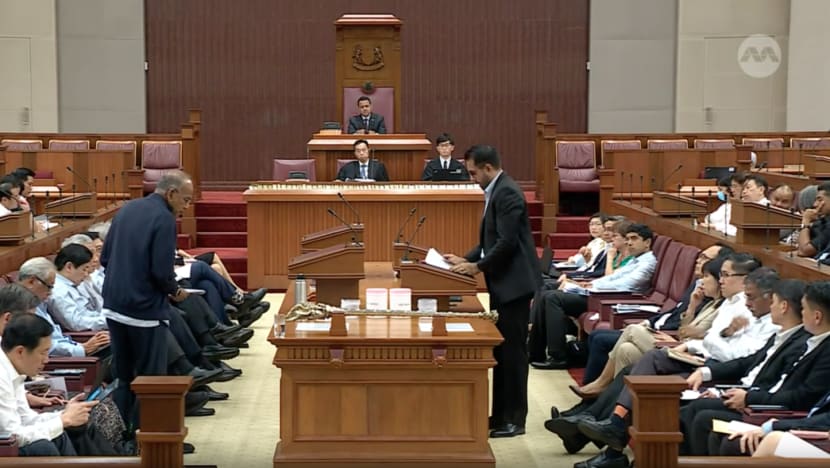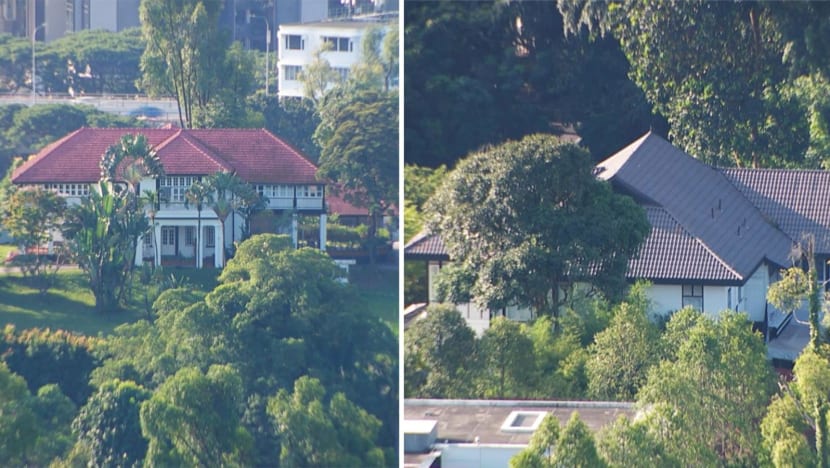Ridout Road parliament debate: MPs raise questions on conflict of interest, code of conduct
Senior Minister Teo Chee Hean also addressed a query on whether it was appropriate for him to head an independent review of the matter.

Leader of the Opposition Pritam Singh speaking in parliament on Jul 3, 2023.
SINGAPORE: Several Members of Parliament (MPs) on Monday (Jul 3) raised questions in the House on possible perceptions of conflict of interest in relation to two Cabinet ministers renting state properties, as well as on whether their actions were in line with Singapore's ministerial code of conduct.
Leader of the Opposition Pritam Singh and other MPs not from the ruling People's Action Party (PAP) nevertheless acknowledged that there was no corruption or wrongdoing in the matter.
The lawmakers were given the chance to seek clarifications during a six-hour parliamentary debate which included statements by Home and Law Affairs Minister K Shanmugam, Foreign Affairs Minister Vivian Balakrishnan, Senior Minister Teo Chee Hean and Second Minister for Law Edwin Tong.
In May, it came to light that Mr Shanmugam and Dr Balakrishnan had rented black-and-white bungalows at 26 and 31 Ridout Road respectively.
The Singapore Land Authority (SLA), which rented out the properties, is overseen by the Law Ministry helmed by Mr Shanmugam and Mr Tong.
Mr Teo – who headed an independent review of the matter – repeatedly told the House on Monday that there was no potential conflict of interest, given that Mr Shanmugam had recused himself from any decision-making on his rental.
In a report to the Prime Minister released last week on Jun 28, Mr Teo found that Mr Shanmugam, Dr Balakrishnan and public officers and private sector intermediaries involved had conducted themselves properly in the rental transactions.
His report, as well as another by the Corrupt Practices Investigation Bureau (CPIB), also found no evidence of criminal wrongdoing or preferential treatment given to the two Cabinet ministers.
Related:
WHAT CONSTITUTES CONFLICT OF INTEREST?
On Monday, Mr Zhulkarnain Abdul Rahim (PAP-Chua Chu Kang) asked Mr Teo to comment on the code of conduct for ministers, and how the standards it spells out should be looked at in light of Mr Shanmugam’s case.
The code – in force since 1954 – states that ministers “must scrupulously avoid any actual or apparent conflict of interest between his office and his private financial interests”.
Such a conflict, or a perception of conflict, can arise “from the exercise of powers or influence in a way that benefits or may be seen to benefit private interests held”.
According to the code, ministers must also never enter any transactions “where his private financial interest might, even conceivably, come into conflict with his public duty”.
Several Members of Parliament (MPs) on Monday (Jul 3) raised questions in the House on possible perceptions of conflict of interest in relation to two Cabinet ministers renting state properties, as well as on whether their actions were in line with Singapore's ministerial code of conduct.
Related:
In his response to Mr Zhulkarnain, Mr Teo sought to define conflict of interest.
He noted that it arises when someone’s duty comes into conflict with their personal interest, which means both elements have to exist.
In terms of potential conflict of interest, Mr Teo said this happens when a conflicted person is in a position to make a decision but does not do so yet.
“Either of these scenarios has to depend on the specific facts of each case. A conflict (of interest) is not a conflict just because of someone’s perception of the facts,” he added.
Mr Teo then referenced his report, where he had found there was potential for conflict of interest to arise.
However Mr Shanmugam had taken steps to prevent this, including recusing himself from any decision-making on the matter.
“He no longer had any duty in this matter, and therefore that factor disappears. Once there is a recusal, no duty arises,” Mr Teo said, noting that lawyers had told him that disclosing potential conflict and recusing oneself from the decision-making process was the “best way” of dealing with it.
“On the facts of this case, given the recusal and removal from duty, there can no longer be any potential conflict, nor does a perception of conflict arise, and therefore there is no breach of the code of conduct (for ministers).”
Mr Teo also responded to Mr Sitoh Yih Pin (PAP-Potong Pasir) asking if it was appropriate for him to oversee an independent review of the matter.
When Mr Shanmugam initially wanted to rent the Ridout Road property, he told Mr Teo that if the matter had to go beyond then-Senior Minister of State for Law Indranee Rajah, she would approach Mr Teo.
Mr Teo said on Monday that there was no conflict of interest on his part, given that he had not been involved in the Ridout Road rental transactions and was not a subject of either the CPIB investigation or independent review.

Mr Teo then addressed a question by Ms Sylvia Lim (Workers' Party-Aljunied), who described the senior minister as reducing the issue of conflict of interest into a "legal argument”.
Ms Lim asked if he agreed that the ministerial code of conduct embodies the highest standards expected of ministers and the conduct of their public affairs, and that it should not be the subject of legal arguments or technicalities.
Mr Teo reiterated his point that “two things must come together at the same time” in order for conflict of interest to arise - and that this was “not a legal description”.
“As I said, there are perceptions, but once the actual conflict of interest and the potential conflict of interest have been removed, that should dispel the perception of conflict of interest in any fair-minded person,” he added.
FOLLOW THE LETTER AND SPIRIT OF CODE OF CONDUCT
Associate Professor Jamus Lim (WP-Sengkang) asked Mr Shanmugam and Dr Balakrishnan whether, in hindsight, they took any actions that they now believe could be perceived as a conflict of interest.
In response, Mr Shanmugam said he had thought about the possibility of perceived conflict - which was why he took the steps he did.
He also asked the House if ministers such as himself, in charge of ministries, must not engage in any transactions open to public citizens.
Among several hypothetical scenarios he gave was the health minister going to a public hospital for a knee replacement.
“He is not in actual conflict. He is not asking them to charge him anything else, if not the prime minister will ask CPIB to look at it,” Mr Shanmugam said.
“But someone can say, you are the minister of health. You have a say in appointing the CEOs. You are the person who decides on the structure and, in some ways, their career progress. They might treat you better than they might treat others and therefore, you are in perceived conflict.
“Can a government work on this basis, that it’s entirely up to a subjective viewpoint on perception, perceived conflict?” Mr Shanmugam asked.
He echoed Mr Teo’s earlier words to MPs, that it was important for ministers not just to follow the letter of the ministerial code of conduct, but also its spirit.
“It’s got to have common sense ... It’s got to be applied sensibly and properly but rigorously,” Mr Shanmugam added.
DID CPIB SEIZE MOBILE PHONES?
Towards the end of the parliamentary sitting, Mr Shanmugam and Dr Balakrishnan responded to a question from WP chief Mr Singh on whether their mobile devices had been seized by CPIB and returned at the end of investigations.
Mr Shanmugam said CPIB looked through his phones and emails. He said his text messages were set on auto-deletion mode, which meant his phones “did not have any relevant messages” and there was no need for CPIB to seize the devices.
But he added that CPIB knew of messages he exchanged with others.
“I was asked questions on some of them because some people keep messages for five years, and those messages were taken by CPIB from others who had sent me messages.
“I don’t know what they have, I don’t know what they don’t have, but I was shown some,” Mr Shanmugam said.
Dr Balakrishnan said there was no need for him to surrender his phone since he had not communicated with SLA or the managing agent.
He added: “However, I should add that every single message between my wife and the managing agent – and subsequently with SLA staff – was in the hands of CPIB … So they had sight of every single message.”










.jpg?itok=riat03A-)











